Reimagining both the peg and the hole in the conversation between Christianity and science
By Simon Appoloni

Have you noticed that within many of the current leading classifications of the religion-science relationship (such as those proposed by Ian Barbour, Willem Drees, Philip Hefner, Ted Peters, or John Haught), there is an implicit or explicit goal within the author’s classification? For some, it could be demonstrating the plausibility of a deity. For others, it could be upholding the relevance of Christianity, or the authority of science. If left at that, there would be no problem, as these thinkers would merely be arguing from a particular point of view. Instead, however, more often than not, you find each universalizing their own categories, suggesting not so much a description about the religion-science nexus, but ultimately a prescription of how it actually ought to be. The love for Christianity is not one that necessarily stays in one area, or has one line of focus, there are many who practice religion by going on holy land tours to find their inner peace, whereas others do it by themselves and keep it within them. There has never been one formula.
It’s this prescriptive push to the religion-science nexus I wish to discuss here. What would happen if rather than putting forth a classification as comprehensive or downplaying one’s intent, authors stress their purpose? Specific to the intents of four Christian thinkers whose works I have examined – Rosemary Radford Ruether, Leonardo Boff, Diarmuid O’Murchu, and Thomas Berry – is the engagement with science with the explicit goal of uniting a liberation theology-inspired agenda with an environmental ethic.
In each of their approaches, points of view and standpoints matter. Rather than just inquiring how prevalent scientific methodologies or traditional understandings of the Christian faith can foster an ethical, liberationist vision for our time – the proverbial ‘trying to wedge a square peg into a round hole,’ as many theorists do – these four Christian thinkers have sought out to formulate new paradigms for both Christianity and for science. Their collective works focus on two interrelated questions, not always manifest within the religion and science debates: what kind of science, and what kind of Christianity, do we need today and tomorrow when the liberation of countless subjects of creation is at stake? Their approach, I suggest, is more like reimagining both the peg and the hole.
Why is this reimagining important? Well, consider what is at stake. Our oceans, for example, are becoming increasingly warmer and more acidic due to the increased levels of carbon dioxide humans are creating. Many marine organisms cannot survive such conditions; yet, life on land depends on life in the oceans. And it’s not just ecosystems, plants and animals we need to consider. The life of the majority of the people in the world is also at stake. If you take poverty to entail more than just low levels of income per day, and to include deprivation, social exclusion and lack of participation in daily life affairs, the amount of humans suffering from a life of exclusion and deprivation is staggering. Consider as well that the vulnerability of the majority of people in the world is increasingly further threatened by climate change, and the decline of other planetary ecosystems.
Humanity is being challenged today with crisis-level problems that seem to defy easy characterization, let alone any final solution. The four thinkers above make this situation their starting point. What, for instance, does “common good,” a prominent principle of Catholic social teaching, mean when the projected rates of biodiversity loss caused by humans are so huge in proportion that they constitute the sixth major extinction occurrence in our planet’s history? Within this context, you’d expect a critical integration to allow the facts surrounding species extinction to permeate the character of the common good, as well as qualify it, that is, to modify or, in some way, limit it.
In short, to Ruether, Boff, O’Murchu, and Berry, the manner in which Christian thinkers today are being implored to approach science and their faith is redolent of a deep influence that weighs upon them, requiring an enormous degree of openness to allowing their religious tradition to be vulnerable to different perspectives, allowing the discourses and wisdoms of science (as well as other traditions), to deeply imbue, challenge and even change their thinking.
I call this approach “liberationally-pragmatic.” Truth is measured more by the quality with which all subjects in creation can participate in their own (Earthly) liberation, rather than merely being consistent with what we know of the world through science or indeed with tenets of the Christian faith. By pragmatic, I refer to a perspective taken by philosopher John Dewey that sees truth as an instrument used by human beings to solve their problems in a radically democratic fashion. In building solidarity with marginalized peoples, one attempts to clarify the cause of suffering, with the goal of reconstructing (not just deconstructing) a just system within a democratic framework.
The reimagined Christianity and science Ruether, Boff, O’Murchu and Berry suggest we need, then, represents a new typology in the religion-science debates. Here, for instance, Christianity is approached in a mature fashion, open to challenge on all its teachings, not as dissent necessarily (though that option is not excluded). It is also a faith that first and foremost seeks the liberation of all of creation. It encourages its adherents to be part of a conversation with other wisdoms, and not just science, which helps them unearth deeper truths. Science, on the one hand, eschews reductionist and mechanistic assumptions, and challenges presumptions that science produces final, precise estimates about reality that are free from uncertainty. It is a science that is broader in scope: it is inclusive of moral values and informed by inputs from communities and individuals affected by scientific and technological developments.
It is important to remind ourselves that the religion-science nexus is not your ordinary academic endeavour: it relates to issues of life and death, the search for meaning, and is always slanted in a particular direction. To my knowledge – and please inform me if otherwise – the questions ‘What kind of science, and Christianity, might we need today and tomorrow in order to address our pressing ethical problems’ is not being addressed. We are too wedded to ineffectual paradigms. As a new typology, the liberationally-pragmatic approach rests squarely on intent, which is the liberation of all Earth subjects, which – to finish with my metaphor – begins with a conversation between religion and science that reimagines both the peg and the hole.
 Simon Appolloni, PhD is a Sessional Instructor in the Department for the Study of Religion and the School of the Environment at the University of Toronto, Canada. More of his writing can be found Philip Hefner.
Simon Appolloni, PhD is a Sessional Instructor in the Department for the Study of Religion and the School of the Environment at the University of Toronto, Canada. More of his writing can be found Philip Hefner.
